Removal of Wisdom Teeth
Wisdom teeth in need of removal may cause pain and infection if they are unable to break through the gums.
Dr. John Doe performs wisdom tooth extractions as a highly experienced oral and maxillofacial surgeon. Having a good rapport with him, he can answer any questions you may have, but also listens well, so be sure to tell him about any concerns you may have – he will have the time to answer and address them sensitively.
One or more of your wisdom teeth may require removal by an oral surgeon for a variety of reasons, including:
– Your wisdom teeth are placing pressure on your neighboring teeth.
– One or more of them are infected.
– Your wisdom teeth are causing crowding while going through orthodontic treatment.
– Your neighboring teeth are eroding
– Your gums or bones are being damaged by a cyst that has formed on your wisdom tooth.
– The food particles become trapped between your wisdom tooth and neighboring teeth.
– Wisdom teeth that are abscessed and growing sideways have led to an ulcer.
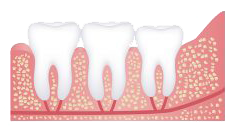
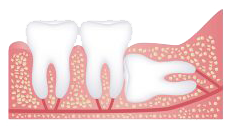
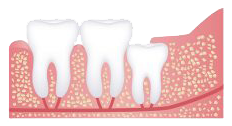
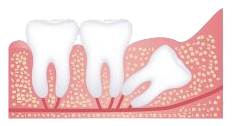
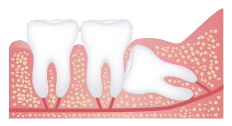
Expert dental extractions
That’s right, your wisdom teeth are your third set of molars. Their position is right at the back of your mouth, and they are the last ones to come out. The average person has four, although they may not have a full set. A few people actually have more than four.
When you are between the ages of 16 and 20, the first teeth begin to move and break through your gums, though some people may not experience this phenomenon until later in life. The wisdom tooth won’t need to be extracted if you have a wide enough jaw and good dental hygiene.
It’s possible, however, for wisdom teeth to get stuck (impacted) as they try to emerge. This can cause pain, infections, and need to be extracted. You may book an appointment at our practice with our friendly staff by calling 000-000-0000 to discuss the pros and cons of wisdom tooth extraction. Dental emergencies and routine dental care are both welcome at our office. Easily accessible offsite parking is available at our dental practice.
Wisdom Teeth Surgery for a Painful Wisdom Tooth
An impacted wisdom tooth can cause pain on surrounding teeth and may send a throbbing sensation into your ear and down your throat.
Bone or Gum Infection
A wisdom tooth that has been severely impacted can become infected, resulting in red, swollen gums, and causing radiating dental pain. In addition to bad breath and difficulty swallowing, an infection can also leave you feeling unwell and suffer from a bad taste in your mouth. The pus from severe infections can spread to the lungs and heart, posing a serious health risk. Routine and emergency surgical procedures are common to Dr. John Doe’s practice.
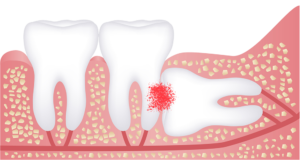
Dental crowding and damage to orthodontic work
Tooth Erosion
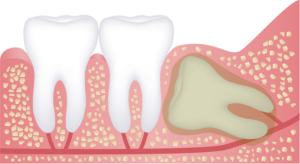
Dental Cysts
Unerupted teeth are prone to cyst formation. As well as damaging teeth and gums, cysts can displace teeth.
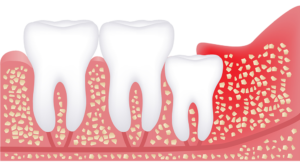
Tooth Decay
There is a possibility that food can get stuck between your wisdom tooth and the neighboring tooth. Neither tooth will be spared from cavities resulting from this.
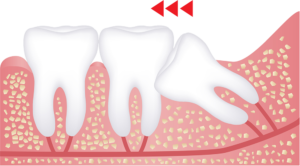
Mouth Ulcers
Wisdom teeth can cause mouth ulcers if they grow out of your gum sideways, forcing your cheek to rub against the tooth.
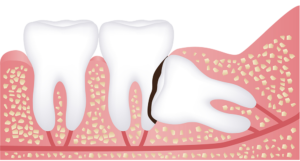
Wisdom teeth removal alternatives: Are they available?
In the short term, antibiotic treatments could be helpful if your wisdom teeth are infected. Nevertheless, the infection will most likely return. It is possible that these infections will become complicated and spread to your chest or heart. A wisdom tooth infection can be more problematic if you have other health issues. A long-term solution such as oral surgery can be extremely effective.
If a tooth is clean and completely through the gums, it may not cause any problems or require treatment. Please refer to our guide on Do I Need My Wisdom Teeth Removed? to learn more about the reasons why we recommend having them removed.
Wisdom teeth are better removed when you are young
During the early years of your life, the roots of your teeth are not fully developed, and the surrounding bone is softer. Consequently, your postoperative discomfort will be reduced and healing will be faster. For a complete overview of the procedure and associated pricing, feel free to contact Dr. Doe.
In what locations in California does wisdom tooth removal take place?
Wisdom teeth removal by Dr. John Doe is performed in private hospitals under general anesthetic, or in his private offices under intravenous (IV) sedation or local anesthetic.
As a patient, you’ll discuss your options with Dr. John Doe. The selection of the venue will depend on how many teeth need to be removed, how difficult extraction surgery is for you, and your general health.
Are there any anesthesia or sedation specialists on the team for Dr. John Doe?
Nurse sedationists perform IV sedation for some dental practitioners. The wisdom teeth removal surgery is always performed by a specially trained medical doctor, who is a local anesthetist, for safety reasons.
How is a tooth extracted?
If all four wisdom teeth need to be removed, the surgery can take anywhere from 15 to 45 minutes. A gum incision will be made by Dr. John Doe, your oral surgeon. It may be necessary to remove a small part of the bone and separate the tooth into pieces before removing it.
In that case, there is a higher degree of difficulty in extracting the tooth since it is located at the back of your mouth and there is limited access available. Near your lower wisdom teeth are major arteries and nerves. A carefully planned surgery is performed before a tooth is extracted to reduce the risks of injury to nearby nerves and blood vessels as well as the jaw bone.
Recovery
Wisdom Teeth Day Surgery
You will require someone to help you get home after your surgery if you are under general anesthesia or intravenous sedation. You can drive home yourself if you receive local anesthesia.
Treating Dental Pain
You can usually get by with painkillers such as Nurofen® and Panadol®. Pain and swelling can be reduced with the help of an icepack.
Returning to Work/School
A few people require 1 to 2 weeks of rest after surgery, while most go back to work after a few days. You would need to decide which wisdom teeth to remove, what type of surgery you will undergo, and how well you are feeling.
Stitches after tooth extraction
The most common type of stitch is a dissolving stitch. Over the course of one to two weeks, they gradually dissolve.
Diet after having your wisdom teeth removed
The first 3 to 4 days following surgery should be spent on a soft food diet. Most likely, by the end of one to two weeks following surgery, you will be able to eat and drink normally.
Wisdom Tooth extraction follow-up
Dr. Doe will schedule a follow-up appointment with you after your extractions to ensure your recovery has been successful.
Your initial consultation with Dr. Doe will include detailed instructions regarding your post-operative care. It’s vital that you pay close attention to these instructions in order to maximize your chances of a rapid recovery. Our website has general information regarding post-operative care and patient recovery.
Schedule an appointment with us
We can provide you with the answers to any wisdom teeth removal questions you may have by calling 000-000-0000. There is plenty of offsite parking at Dr. John Doe’s office and every aspect of pricing is discussed during your initial consultation.
Possible complications
There is a low probability of complications following wisdom teeth removal by a skilled oral and maxillofacial surgeon.
Getting the procedure done has some potential risks and complications, like all other invasive surgeries:
– Infection
– Nerve damage leading to numbness in the face and mouth
– Dry socket
Risks are inherent to all dental and surgical procedures. Obtain the opinion of an appropriately qualified healthcare professional before proceeding.
What are the costs of wisdom teeth removal?
Factors affecting this can include many things. The question of whether Medicare will cover the cost is on the minds of many patients. Your initial consultation fee will be partially reimbursed by Medicare.
When you come in for your initial consultation, Dr. Doe will present you with a written quote for the wisdom tooth extraction procedure. Our team can also assist you in making the appropriate Medicare claims and private health insurance claims to find out how much of the cost will be covered.
We will provide you with the contact information for the anesthetist if anesthesia is required for your teeth extraction procedure. Some of the anesthetist’s costs will be covered by Medicare and private insurance.
How can an oral and maxillofacial surgeon help you?
Treatment options are the widest possible
The best and widest range of dental implant options can only be provided by a specialist in oral and maxillofacial surgery.
Technology at the highest level
Wisdom teeth are extracted by dental professionals who are highly trained and skilled, which ensures a high-quality procedure. In addition to simple surgeries, they can perform more complicated procedures like bone grafting.
Keeping your medical conditions under control will allow you to live a longer and healthier life
A physician trained in oral and maxillofacial surgery can handle any medical conditions you have (not just wisdom tooth removals) and administer medications to decrease risk. They are prepared to handle complications if they arise.
Methods of safe extraction
Oral and maxillofacial surgeons operate only after sterilization protocol of hospital grade (under the training they receive as medical specialists). Using the services of an oral and maxillofacial surgeon will ensure that your wisdom teeth procedure is as safe as possible.
Only use anesthetists who are specialists
Anesthetists who administer intravenous sedation or general anesthesia are always specialists.
The surgeon, Dr. John Doe, specializes in the extraction of wisdom teeth and has a wealth of experience. His explanations are clear and he is a good listener, so don’t hesitate to ask him questions and convey any concerns you have – you’ll find that he will effectively address them. To discuss options and costs, schedule an appointment at his practice, which has ample off-street parking.
Our comprehensive guides explain why wisdom teeth need to be removed.